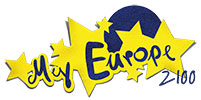When asked to predict the future of Europe in the year of 2030, I thought to myself “Oh dear, I don’t even know what I am planning to do next Saturday!”. Imagining the future of a community as broad and versatile is, by all means, a great challenge, especially in this fast-changing world. I believe that the key to the future lies within the lessons of the past and issues of the present. That is why, to answer the question what my Europe will be in just a bit less than twenty years, I have to search for the reasons which helped us to become the force we are now and start from the very beginning of this union.
The EU began as a political and economical alliance in 1950 with the signing of the European Coal and Steel Community treaty. After the ravage and devastating loss of the Second World War it was the time when Europe finally realized that unity is the essence of peace, cooperation and freedom. Since then our region had to face the Cold War, fall of the Iron Curtain, liberation of post- Soviet nations, not so long ago, an economical crisis, which subsequences are still visible in the present. The past century did not spare challenges to the nations and Europe as a whole. Nevertheless, from the six founders of the EU, this union has grown into a wide alliance of 28 countries, becoming one of the most powerful political voices in the world. It is an undeniable truth that with power comes a great responsibility. As the problems of economy, security, political stability are starting to reveal, the unity of the EU is questioned once again. In the face of new challenges, Europe is not the same as it was before. Euroscepticism seems to has taken its lead, raising a deeper problem – the failing of European identity. There still is a big number of people who does not refer to themselves as Europeans, some even started to doubt that the EU will last more than twenty years. What happened? Did our values and principles change? Have we forgotten our responsibility to protect everything we have been building all these years?
Political and economic subjects have always been a priority of the EU. Its founders believed that a shared market, free movement of goods and people will be a guarantee to peace and unity. Economics and national interests was the power that joined us together. There is no doubt that creating a common marketplace, developing diplomatic relations is one of the main goals of any excisting union because of their obvious practical benefit to its members. But this priority of national interests raises an important question – will countries ever decide to join or stay in the EU because of the common good? And that, in my view, is a question of European identity.
Of course, Germany or any other country of the EU has no benefit from, for example, paying Greeces debts. But that is what the EU, that is what European character is all about. Helping each other not only in good times, but in bad. I wish people would perceive it as not something to be eurosceptical about, but as a way to reach the common good. By that I mean not only politically, economically, but culturally as well.
Cultural bond is a huge part of our European identities. However, euro-sceptics believe that immersion into multi-cultural community is a threat to their national heritage. This is what stops them to fully adapt in the EU community. Fear of loosing national identity is the complete opposite of what I believe should form our common character. Cultural diversity is not a force which separates, it is what brings us together, what makes the EU special and remarkable. By respecting distinction we can acknowledge different roads which lead to the same goal – unity, weath and versatility. That, in my view, is the essence of the European Union. It was made by Europeans and for them, focusing on their dreams, ideas and values no matter what nationality they were. That is why I am saying that the future of Europe is, firstly, the future of every single one of us. As the borders began to disappear, it is significant to understand that we are a part of one community, a wider perception of nationality – the EU. Altough we cherish different traditions, languages, attitudes we share the same future and the same identity – European identity.
It can only be formed by investing in education and culture. By education that explains the fundamentals of the EU, clarifies how this union works and what are our rights in it. No joint currency or single market can bond people together as exchange of culture and heritage, shared scale of values and goals, united desire for good. Silvija Kalinauskaitė 3rd Prize Vilnius Mykolas Biržiška Gymnasium E.U. – Europe. Unite. 2 We must remember the foundation stone of our union – United in Diversity. Cultural, political differences is our strenght. It is what makes us oppose, compromise and reach the best decisions. Diversity and unity should not be a reason for scepticism. I hope that in that in 2030 we could all proudly refer to ourselves as Europeans. We are already chained together politically and economically, but that is not enough for a strong community. Sharing the same goals, respecting our differences and most importantly reaching the common good has to be our main future task. We are already a union, but are we really united? That is why I say – Europe. Unite!
